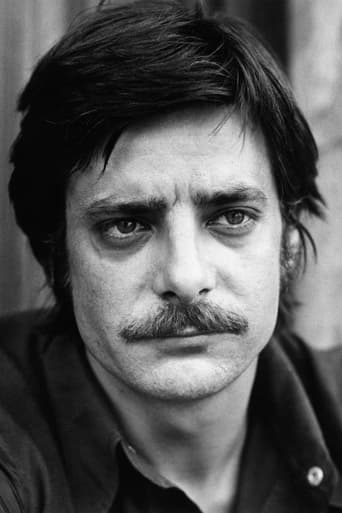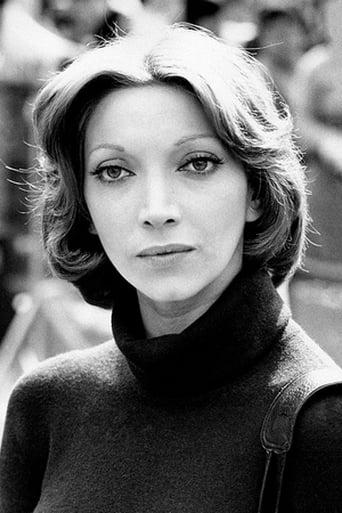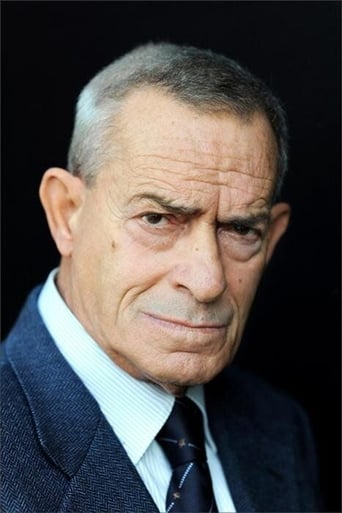Moustroll
Good movie but grossly overrated
Cleveronix
A different way of telling a story
BelSports
This is a coming of age storyline that you've seen in one form or another for decades. It takes a truly unique voice to make yet another one worth watching.
mirkobozic
Lina Wertmüller, the brilliant director who had her masterpiece Swept Away famously ravaged by Madonna,seems to have an approach to her actors like a woman to a great couture dress: if it works great, wear it again. And this she did-just like in Swept Away, we have Giancarlo Giannini and Maria Mellato in the leading roles, playing a country boy coming to Rome to avenge his friend's assassination by the Fascists through murdering Mussolini. Though Fascicsm may be the motif driving the story, the center stage for this juicy treat of a film is a Roman brothel where Giannini's character finds refuge, and gets drawn into the miniature universe of prostitutes and Madames varying from obnoxiously ugly to attractive, but each one loud-mouthed and bursting with passion regarding everything they do or say. Giannini created a masterpiece with his leading role, a man tortured both spiritually and visually, but we still can see the beauty of his piercing blue eyes underneath all that dirt and scars. Melato turned the prostitute stereotype into a whole new direction with the twist in the end where we see that even though she'd never admit it, it's not always about the money, but about the heart. Lina Wermtüller's movies usually revolve around male-female stories put into some sort of an extreme environment(a deserted island, fascist Rome), which makes her stories essentially much smaller in scale, at least when it comes to the core, a cat-and-mouse play between two equally passionate people. Of course, you have all your Italian stereotypes neatly arranged here as if it were on a shelf: curvy,beautiful girls, lots of smoking, cursing and alcohol, a bit of politics and a love story. As they would say: bravissimo.
Jay Raskin
I saw this film two times in 1973 and a few years later again in art cinemas in the United States. I vividly remember the opening line, "I'm off to kill Mussolini. Screw the rest." While Fox Lorber put this film on DVD in 1997, it is now unavailable and sells for $37 used. I bought a made-in-China copy for $5 on Ebay. I was a bit upset when the first title read only "I'm off to kill Mussolini." I wondered why the change? Anyways the rest of the DVD seemed fine.This is an amazing film. The acting by everyone is superb, with Giancarlo Gianini giving a performance that won him a best acting award at the Cannes film festival and should have won him an Oscar. He is Chaplinesque, but not imitative of Chaplin or anybody else. It is one of the most sympathetic performances ever given. In many scenes, he doesn't talk, but you sense his feelings of anger or sadness. His mass of freckles on his face make him look more like a 14 year old than a man planning a major political assassination. Mariangela Melato is sexy, foul-mouthed and hilarious. She also manages to make you believe that she is both a cynical prostitute and a politically and culturally aware anarchist. Lina Polito is the young prostitute with hope. She gives a performance similar to and as wonderful as Liza Minnelli in "Cabaret." The musical score by Federico Fellini's main composer, Nino Rota, is energetic and terrific. It often counterpoints the action on the screen, bringing us away from it, and making some harsh scenes seem comical, but it also heightens the playfulness or menace in other crucial scenes. He won an Oscar for the Godfather Part II a few years later, but he deserved one here too. This is a tribute to the European nihilist and anarchist movements of the 1800 and 1900's. It is also powerfully anti-fascist.This is great and enthralling film-making. It is Lina Wertmuller's best film and still stands out today, nearly 40 years later, as a great historical and humanist work of art. It is sad that more people do not know about it and have not had the opportunity to experience it.Having seen about 6,000 films (150 films X 40 years), I would put this one in the top twenty.
fred-houpt
It's such a shame that Wertmuller no longer commands the interest of producers. She gave us such powerful films, and at her peak, she and Giannini could do no wrong. European directors have given us films that excoriate Fascists. There is Bertoluci's "1900" and "The Conformist"; Costa Gravas's "Missing", there is "Schindler's List","The Pianist", "Two Women" are just a few of a long list. What does Wertmuller show us? Simple people get caught up in every single war, WW 2 was no exception. There were probably all kinds of attempts to kill Mussolini before he was finally caught and hung up like a piece of meat. This movie takes place early in the rise of El Duce. To openly show displeasure with his black shirted thugs would guarantee a short and brutal outcome. The same held true for those brave and furious souls in Spain and Germany who tried (in vain) to stand up against Fascism. The main story in this drama is the almost mad plans of a simple country bumpkin who seeks to avenge the murder of an "anarchist" who planned to kill Mussolini but got carried away and told everyone in the town of his plans. Next thing we see is him murdered. Giannini's character shows up in Rome and seeks refuge in a brothel (all pre-arranged), after having gone to France for training in shooting a gun. Much has been made of the mayhem inside the brothel but to me this is color adding to the texture, it is subtext. The main body of this drama evolves with Tunin and his trembling approach to the plot. That he becomes embroiled in an unexpected love for a prostitute is but one twist in the plot. There are several wonderful scenes where he has ample opportunity to kill a vile fascist thug who is a regular at the brothel but he refuses to get sidetracked. Even after having fallen in love he still refuses to divert from his presumed destiny. He fully expects to either fail or even if successful to get caught and killed for his efforts. "Tunin" tries to make sense of his confused feelings and at the end has to abandon clarity for duty. He is confused, frightened and compelled to honor his fallen comrade. The surprise twist (I won't spoil it) at the end of the film pushes him over the edge into an irrational, spontaneous and self destructive spree. His fate once met is anti=climactic, he having already intuited the end. The film is funny, tense and upsetting. I simply cannot believe how fast Mariangela Melato speaks, she sounds like the fast rattle of a machine gun. The cast is totally wonderful, the direction tight, with evocative single frame shots of Tunin in a pose, creating a "snapshot" feel, supporting his introspection as he plans. (An aside: what is up with Giannini's face? He looks like his face was covered in splotches ...like freckles; he looked sickly and scary and did not look like this in "Swept Away") Anyway, a really powerful drama, the likes of which we just don't see today.
cindycita76
I loved, loved, loved this film. This is Wertmuller's best film in my opinion.SPOILERS Tunin is a poor farmer from the south who decides he must take over the role of Mussolini's assassin after his older, anarchist friend is killed by the fascists in his attempt to assassinate Mussolini.Tunin meets his conspiratorial contact in a brothel, where she works undercover, so to speak. He also meets another prostitute with whom he falls in love. Wertmuller does a very good job with the romantic storyline as well.Although Tunin's first reason for assassinating Mussolini was that he "hates tyrants," he also was doing it to get revenge for his friend, but also he hoped that in this act he would "beome" someone. This story had a more universal theme of how people try to become "someone" when they feel like a "no one," and it also makes you wonder how many people there are that were like Tunin, trying to change things and failing to the point that no one even knew they had tried in the first place.
Sadly, in the end, Tunin remains an unknown, and it is so sad, yet the ending is so well done, and I really think the original title is much more powerful than just "Love and Anarchy" because of the ending. At 10 o'clock in the morning, in via dei Fiori, in a well-known brothel... he is no one. I love Giancarlo Giannini, and he does a really good job in this film playing a different character than his usual Wertmuller characters.





